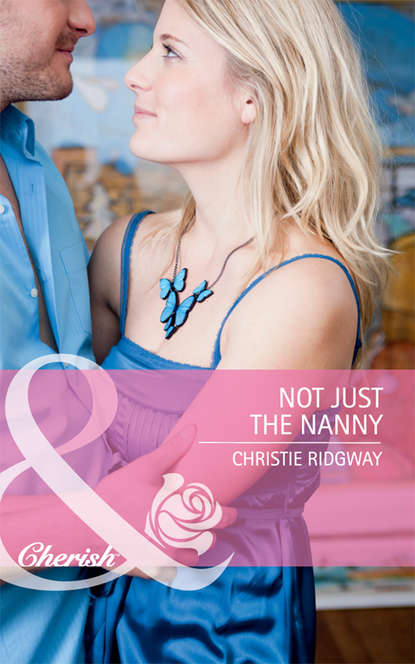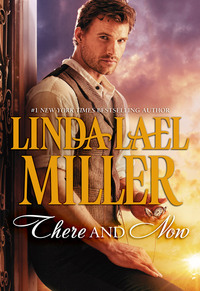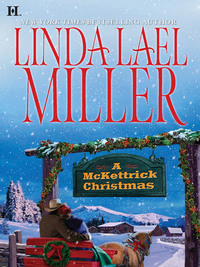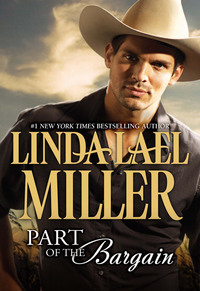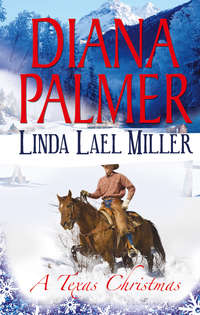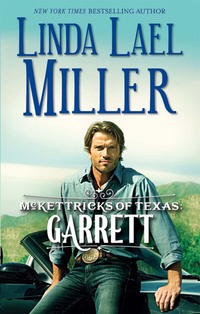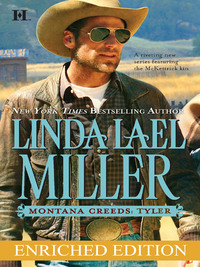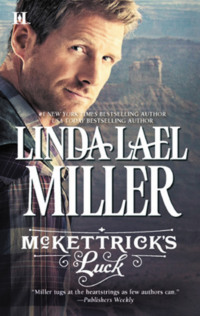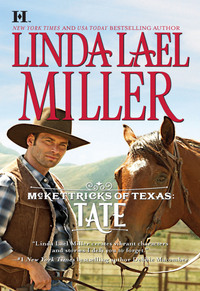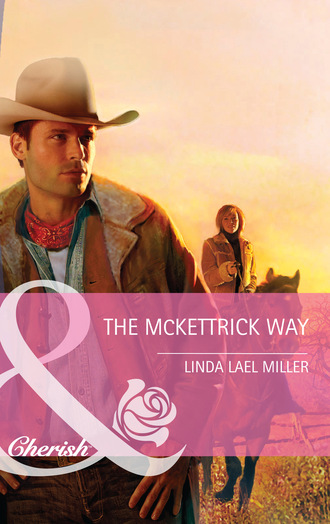
Полная версия
The Mckettrick Way
What if the Dixie Dog had closed down?
What if it was boarded up, with litter and sagebrush tumbling through a deserted parking lot?
And what the hell did it matter, anyhow?
Brad shoved a hand through his hair. Maybe Phil and everybody else was right—maybe he was crazy to turn down the Vegas deal. Maybe he would end up sitting in the barn, serenading a bunch of horses.
He rounded a bend, and there was the Dixie Dog, still open. Its big neon sign, a giant hot dog, was all lit up and going through its corny sequence—first it was covered in red squiggles of light, meant to suggest catsup, and then yellow, for mustard. There were a few cars lined up in the drive-through lane, a few more in the parking lot.
Brad pulled into one of the slots next to a speaker and rolled down the truck window.
“Welcome to the Dixie Dog Drive-In,” a youthful female voice chirped over the bad wiring. “What can I get you today?”
Brad hadn’t thought that far, but he was starved. He peered at the light-up menu box under the chunky metal speaker. Then the obvious choice struck him and he said, “I’ll take a Dixie Dog,” he said. “Hold the chili and onions.”
“Coming right up” was the cheerful response. “Anything to drink?”
“Chocolate shake,” he decided. “Extra thick.”
His cell phone rang again.
He ignored it again.
The girl thanked him and roller-skated out with the order about five minutes later.
When she wheeled up to the driver’s-side window, smiling, her eyes went wide with recognition, and she dropped the tray with a clatter.
Silently, Brad swore. Damn if he hadn’t forgotten he was famous.
The girl, a skinny thing wearing too much eye makeup, immediately started to cry. “I’m sorry!” she sobbed, squatting to gather up the mess.
“It’s okay,” Brad answered quietly, leaning to look down at her, catching a glimpse of her plastic name tag. “It’s okay, Mandy. No harm done.”
“I’ll get you another dog and a shake right away, Mr. O’Ballivan!”
“Mandy?”
She stared up at him pitifully, sniffling. Thanks to the copious tears, most of the goop on her eyes had slid south. “Yes?”
“When you go back inside, could you not mention seeing me?”
“But you’re Brad O’Ballivan!”
“Yeah,” he answered, suppressing a sigh. “I know.”
She was standing up again by then, the tray of gathered debris clasped in both hands. She seemed to sway a little on her rollers. “Meeting you is just about the most important thing that’s ever happened to me in my whole entire life. I don’t know if I could keep it a secret even if I tried!”
Brad leaned his head against the back of the truck seat and closed his eyes. “Not forever, Mandy,” he said. “Just long enough for me to eat a Dixie Dog in peace.”
She rolled a little closer. “You wouldn’t happen to have a picture you could autograph for me, would you?”
“Not with me,” Brad answered. There were boxes of publicity pictures in storage, along with the requisite T-shirts, slick concert programs and other souvenirs commonly sold on the road. He never carried them, much to Phil’s annoyance.
“You could sign this napkin, though,” Mandy said. “It’s only got a little chocolate on the corner.”
Brad took the paper napkin, and her order pen, and scrawled his name. Handed both items back through the window.
“Now I can tell my grandchildren I spilled your lunch all over the pavement at the Dixie Dog Drive-In, and here’s my proof.” Mandy beamed, waggling the chocolate-stained napkin.
“Just imagine,” Brad said. The slight irony in his tone was wasted on Mandy, which was probably a good thing.
“I won’t tell anybody I saw you until you drive away,” Mandy said with eager resolve. “I think I can last that long.”
“That would be good,” Brad told her.
She turned and whizzed back toward the side entrance to the Dixie Dog.
Brad waited, marveling that he hadn’t considered incidents like this one before he’d decided to come back home. In retrospect, it seemed shortsighted, to say the least, but the truth was, he’d expected to be—Brad O’Ballivan.
Presently, Mandy skated back out again, and this time, she managed to hold on to the tray.
“I didn’t tell a soul!” she whispered. “But Heather and Darlene both asked me why my mascara was all smeared.” Efficiently, she hooked the tray onto the bottom edge of the window.
Brad extended payment, but Mandy shook her head.
“The boss said it’s on the house, since I dumped your first order on the ground.”
He smiled. “Okay, then. Thanks.”
Mandy retreated, and Brad was just reaching for the food when a bright red Blazer whipped into the space beside his. The driver’s-side door sprang open, crashing into the metal speaker, and somebody got out, in a hurry.
Something quickened inside Brad.
And in the next moment, Meg McKettrick was standing practically on his running board, her blue eyes blazing.
Brad grinned. “I guess you’re not over me after all,” he said.
Chapter Two
After Sierra had opened all her shower presents, and cake and punch had been served, Meg had felt the old, familiar tug in the middle of her solar plexus and headed straight for the Dixie Dog Drive-In. Now that she was there, standing next to a truck and all but nose to nose with Brad O’Ballivan through the open window, she didn’t know what to do—or say.
Angus poked her from behind, and she flinched.
“Speak up,” her dead ancestor prodded.
“Stay out of this,” she answered, without thinking.
Puzzlement showed in Brad’s affably handsome face. “Huh?”
“Never mind,” Meg said. She took a step back, straightened. “And I am so over you.”
Brad grinned. “Damned if it didn’t work,” he marveled. He climbed out of the truck to stand facing Meg, ducking around the tray hooked to the door. His dark-blond hair was artfully rumpled, and his clothes were downright ordinary.
“What worked?” Meg demanded, even though she knew.
Laughter sparked in his blue-green eyes, along with considerable pain, and he didn’t bother to comment.
“What are you doing here?” she asked.
Brad spread his hands. Hands that had once played Meg’s body as skillfully as any guitar. Oh, yes. Brad O’Ballivan knew how to set all the chords vibrating.
“Free country,” he said. “Or has Indian Rock finally seceded from the Union with the ranch house on the Triple M for a capitol?”
Since she felt a strong urge to bolt for the Blazer and lay rubber getting out of the Dixie Dog’s parking lot, Meg planted her feet and hoisted her chin. McKettricks, she reminded herself silently, don’t run.
“I heard you were in rehab,” she said, hoping to get under his hide.
“That’s a nasty rumor,” Brad replied cheerfully.
“How about the two ex-wives and that scandal with the actress?”
His grin, insouciant in the first place, merely widened. “Unfortunately, I can’t deny the two ex-wives,” he said. “As for the actress—well, it all depends on whether you believe her version or mine. Have you been following my career, Meg McKettrick?”
Meg reddened.
“Tell him the truth,” Angus counseled. “You never forgot him.”
“No,” Meg said, addressing both Brad and Angus.
Brad looked unconvinced. He was probably just egotistical enough to think she logged onto his Web site regularly, bought all his CDs and read every tabloid article about him that she could get her hands on. Which she did, but that was not the point.
“You’re still the best-looking woman I’ve ever laid eyes on,” he said. “That hasn’t changed, anyhow.”
“I’m not a member of your fan club, O’Ballivan,” Meg informed him. “So hold the insincere flattery, okay?”
One corner of his mouth tilted upward in a half grin, but his eyes were sad. He glanced back toward the truck, then met Meg’s gaze again. “I don’t flatter anybody,” Brad said. Then he sighed. “I guess I’d better get back to Stone Creek.”
Something in his tone piqued Meg’s interest.
Who was she kidding?
Everything about him piqued her interest. As much as she didn’t want that to be true, it was.
“I was sorry to hear about Big John’s passing,” she said. She almost touched his arm, but managed to catch herself just short of it. If she laid a hand on Brad O’Ballivan, who knew what would happen?
“Thanks,” he replied.
A girl on roller skates wheeled out of the drive-in to collect the tray from the window edge of Brad’s truck, her cheeks pink with carefully restrained excitement. “I might have said something to Heather and Darleen,” the teenager confessed, after a curious glance at Meg. “About you being who you are and the autograph and everything.”
Brad muttered something.
The girl skated away.
“I’ve gotta go,” Brad told Meg, looking toward the drive-in. Numerous faces were pressed against the glass door; in another minute, there would probably be a stampede. “I don’t suppose we could have dinner together or something? Maybe tomorrow night? There are—well, there are some things I’d like to say to you.”
“Say yes,” Angus told her.
“I don’t think that would be a good idea,” Meg said.
“A drink, then? There’s a redneck bar in Stone Creek—”
“Don’t be such a damned prig,” Angus protested, nudging her again.
“I’m not a prig.”
Brad frowned, threw another nervous look toward the drive-in and all those grinning faces. “I never said you were,” he replied.
“I wasn’t—” Meg paused, bit her lower lip. I wasn’t talking to you. No, siree, I was talking to Angus McKettrick’s ghost. “Okay,” she agreed, to cover her lapse. “I guess one drink couldn’t do any harm.”
Brad climbed into his truck. The door of the drive-in crashed open, and the adoring hordes poured out, screaming with delight.
“Go!” Meg told him.
“Six o’clock tomorrow night,” Brad reminded her. He backed the truck out, made a narrow turn to avoid running over the approaching herd of admirers and peeled out of the lot.
Meg turned to the disappointed fans. “Brad O’Ballivan,” she said diplomatically, “has left the building.”
Nobody got the joke.
The sun was setting, red-gold shot through with purple, when Brad crested the last hill before home and looked down on Stone Creek Ranch for the first time since his grandfather’s funeral. The creek coursed, silvery-blue, through the middle of the land. The barn and the main house, built by Sam O’Ballivan’s own hands and shored up by every generation to follow, stood as sturdy and imposing as ever. Once, there had been two houses on the place, but the one belonging to Major John Blackstone, the original landowner, had been torn down long ago. Now a copse of oak trees stood where the major had lived, surrounding a few old graves.
Big John was buried there, by special dispensation from the Arizona state government.
A lump formed in Brad’s throat. You see that I’m laid to rest with the old-timers when the bell tolls, Big John had told him once. Not in that cemetery in town.
It had taken some doing, but Brad had made it happen.
He wanted to head straight for Big John’s final resting place, pay his respects first thing, but there was a cluster of cars parked in front of the ranch house. His sisters were waiting to welcome him home.
Brad blinked a couple of times, rubbed his eyes with a thumb and forefinger, and headed for the house.
Time to face the proverbial music.
Meg drove slowly back to the Triple M, going the long way to pass the main ranch house, Angus’s old stomping grounds, in the vain hope that he would decide to haunt it for a while, instead of her. A descendant of Angus’s eldest son, Holt, and daughter-in-law Lorelei, Meg called their place home.
As they bumped across the creek bridge, Angus assessed the large log structure, added onto over the years, and well-maintained.
Though close, all the McKettricks were proud of their particular branch of the family tree. Keegan, who occupied the main house now, along with his wife, Molly, daughter, Devon, and young son, Lucas, could trace his lineage back to Kade, another of Angus’s four sons.
Rance, along with his daughters, was Rafe’s progeny. He and the girls and his bride, Emma, lived in the grandly rustic structure on the other side of the creek from Keegan’s place.
Finally, there was Jesse. He was Jeb’s descendant, and resided, when he wasn’t off somewhere participating in a rodeo or a poker tournament, in the house Jeb had built for his wife, Chloe, high on a hill on the southwestern section of the ranch. Jesse was happily married to a hometown girl, the former Cheyenne Bridges, and like Keegan’s Molly and Rance’s Emma, Cheyenne was expecting a baby.
Everybody, it seemed to Meg, was expecting a baby.
Except her, of course.
She bit her lower lip.
“I bet if you got yourself pregnant by that singing cowboy,” Angus observed, “he’d have the decency to make an honest woman out of you.”
Angus had an uncanny ability to tap into Meg’s wavelength; though he swore he couldn’t read her mind, she wondered sometimes.
“Great idea,” she scoffed. “And for your information, I am an honest woman.”
Keegan was just coming out of the barn as Meg passed; he smiled and waved. She tooted the Blazer’s horn in greeting.
“He sure looks like Kade,” Angus said. “Jesse looks like Jeb, and Rance looks like Rafe.” He sighed. “It sure makes me lonesome for my boys.”
Meg felt a grudging sympathy for Angus. He’d ruined a lot of dates, being an almost constant companion, but she loved him. “Why can’t you be where they are?” she asked softly. “Wherever that is.”
“I’ve got to see to you,” he answered. “You’re the last holdout.”
“I’d be all right, Angus,” she said. She’d asked him about the afterlife, but all he’d ever been willing to say was that there was no such thing as dying, just a change of perspective. Time wasn’t linear, he claimed, but simultaneous. The “whole ball of string,” as he put it, was happening at once—past, present and future. Some of the experiences the women in her family, including herself and Sierra, had had up at Holt’s house lent credence to the theory.
Sierra claimed that, before her marriage to Travis and the subsequent move to the new semi-mansion in town, she and her young son, Liam, had shared the old house with a previous generation of McKettricks—Doss and Hannah and a little boy called Tobias. Sierra had offered journals and photograph albums as proof, and Meg had to admit, her half sister made a compelling case.
Still, and for all that she’d been keeping company with a benevolent ghost since she was little, Meg was a left-brain type.
When Angus didn’t comment on her insistence that she’d get along fine if he went on to the great roundup in the sky, or whatever, Meg tried again. “Look,” she said gently, “when I was little, and Sierra disappeared, and Mom was so frantic to find her that she couldn’t take care of me, I really needed you. But I’m a grown woman now, Angus. I’m independent. I have a life.”
Out of the corner of her eye, she saw Angus’s jaw tighten. “That Hank Breslin,” he said, “was no good for Eve. No better than your father was. Every time the right man came along, she was so busy cozying up to the wrong one that she didn’t even notice what was right in front of her.”
Hank Breslin was Sierra’s father. He’d kidnapped Sierra, only two years old at the time, when Eve served him with divorce papers, and raised her in Mexico. For a variety of reasons, Eve hadn’t reconnected with her lost daughter until recently. Meg’s own father, about whom she knew little, had died in an accident a month before she was born. Nobody liked to talk about him—even his name was a mystery.
“And you think I’ll make the same mistakes my mother did?” Meg said.
“Hell,” Angus said, sparing her a reluctant grin, “right now, even a mistake would be progress.”
“With all due respect,” Meg replied, “having you around all the time is not exactly conducive to romance.”
They started the long climb uphill, headed for the house that now belonged to her and Sierra. Meg had always loved that house—it had been a refuge for her, full of cousins. Looking back, she wondered why, given that Eve had rarely accompanied her on those summer visits, had instead left her daughter in the care of a succession of nannies and, later, aunts and uncles.
Sierra’s kidnapping had been a traumatic event, for certain, but the problems Eve had subsequently developed because of it had left Meg relatively unmarked. She hadn’t been lonely as a child, mainly because of Angus.
“I’ll stay clear tomorrow night, when you go to Stone Creek for that drink,” Angus said.
“You like Brad.”
“Always did. Liked Travis, too.’ Course, I knew he was meant for your sister, that they’d meet up in time.”
Meg and Sierra’s husband, Travis, were old friends. They’d tried to get something going, convinced they were perfect for each other, but it hadn’t worked. Now that Travis and Sierra were together, and ecstatically happy, Meg was glad.
“Don’t get your hopes up,” she said. “About Brad and me, I mean.”
Angus didn’t reply. He appeared to be deep in thought. Or maybe as he looked out at the surrounding countryside, he was remembering his youth, when he’d staked a claim to this land and held it with blood and sweat and sheer McKettrick stubbornness.
“You must have known the O’Ballivans,” Meg reflected, musing. Like her own family, Brad’s had been pioneers in this part of Arizona.
“I was older than dirt by the time Sam O’Ballivan brought his bride, Maddie, up from Haven. Might have seen them once or twice. But I knew Major Blackstone, all right.” Angus smiled at some memory. “He and I used to arm wrestle sometimes, in the card room back of Jolene Bell’s Saloon, when we couldn’t best each other at poker.”
“Who won?” Meg asked, smiling slightly at the image.
“Same as the poker,” Angus answered with a sigh. “We’d always come out about even. He’d win half the time, me the other half.”
The house came in sight, the barn towering nearby. Angus’s expression took on a wistful aspect.
“When you’re here,” Meg ventured, “can you see Doss and Hannah and Tobias? Talk to them?”
“No,” Angus said flatly.
“Why not?” Meg persisted, even though she knew Angus didn’t want to pursue the subject.
“Because they’re not dead,” he said. “They’re just on the other side, like my boys.”
“Well, I’m not dead, either,” Meg said reasonably. She refrained from adding that she could have shown him their graves, up in the McKettrick cemetery. Shown him his own, for that matter. It would have been unkind, of course, but there was another reason for her reluctance, too. In some version of that cemetery, given what he’d told her about time, there was surely a headstone with her name on it.
“You wouldn’t understand,” Angus told her. He always said that, when she tried to find out how it was for him, where he went when he wasn’t following her around.
“Try me,” she said.
He vanished.
Resigned, Meg pulled up in front of the garage, added onto the original house sometime in the 1950s, and equipped with an automatic door opener, and pushed the button so she could drive in.
She half expected to find Angus sitting at the kitchen table when she went into the house, but he wasn’t there.
What she needed, she decided, was a cup of tea.
She got Lorelei’s teapot out of the built-in china cabinet and set it firmly on the counter. The piece was legendary in the family; it had a way of moving back to the cupboard of its own volition, from the table or the counter, and vice versa.
Meg filled the electric kettle at the sink and plugged it in to heat.
Tea was not going to cure what ailed her.
Brad O’Ballivan was back.
Compared to that, ghosts, the mysteries of time and space, and teleporting teapots seemed downright mundane.
And she’d agreed, like a fool, to meet him in Stone Creek for a drink. What had she been thinking?
Standing there in her kitchen, Meg leaned against the counter and folded her arms, waiting for the tea water to boil. Brad had hurt her so badly, she’d thought she’d never recover. For years after he’d dumped her to go to Nashville, she’d barely been able to come back to Indian Rock, and when she had, she’d driven straight to the Dixie Dog, against her will, sat in some rental car, and cried like an idiot.
There are some things I’d like to say to you, Brad had told her, that very day.
“What things?” she asked now, aloud.
The teakettle whistled.
She unplugged it, measured loose orange pekoe into Lorelei’s pot and poured steaming water over it.
It was just a drink, Meg reminded herself. An innocent drink.
She should call Brad, cancel gracefully.
Or, better yet, she could just stand him up. Not show up at all. Just as he’d done to her, way back when, when she’d loved him with all her heart and soul, when she’d believed he meant to make a place for her in his busy, exciting life.
Musing, Meg laid a hand to her lower abdomen.
She’d stopped believing in a lot of things when Brad O’Ballivan ditched her.
Maybe he wanted to apologize.
She gave a teary snort of laughter.
And maybe he really had fans on other planets.
A rap at the back door made her start. Angus? He never knocked—he just appeared. Usually at the most inconvenient possible time.
Meg went to the door, peered through the old, thick panes of greenish glass, saw Travis Reid looming on the other side. She wrestled with the lock and let him in.
“I’m here on reconnaissance,” he announced, taking off his cowboy hat and hanging it on the peg next to the door. “Sierra’s worried about you, and so is Eve.”
Meg put a hand to her forehead. She’d left the baby shower abruptly to go meet Brad at the Dixie Dog Drive-In. “I’m sorry,” she said, stepping back so Travis could come inside. “I’m all right, really. You shouldn’t have come all the way out here—”
“Eve tried your cell—which is evidently off—and Sierra left three or four messages on voice mail,” he said with a nod toward the kitchen telephone. “Consider yourself fortunate that I got here before they called out the National Guard.”
Meg laughed, closed the door against the chilly October twilight, and watched as Travis took off his sheepskin-lined coat and hung it next to the hat. “I was just feeling a little—overwhelmed.”
“Overwhelmed?” She’d been possessed.
Travis went to the telephone, punched in a sequence of numbers and waited. “Hi, honey,” he said presently, when Sierra answered. “Meg’s alive and well. No armed intruders. No bloody accident. She was just—overwhelmed.”
“Tell her I’ll call her later,” Meg said. “Mom, too.”
“She’ll call you later,” Travis repeated dutifully. “Eve, too.” He listened again, promised to pick up a gallon of milk and a loaf of bread on the way home and hung up.
Knowing Travis wasn’t fond of tea, Meg offered him a cup of instant coffee, instead.
He accepted, taking a seat at the table where generations of McKettricks, from Holt and Lorelei on down, had taken their meals. “What’s really going on, Meg?” he asked quietly, watching her as she poured herself some tea and joined him.
“What makes you think anything is going on?”
“I know you. We tried to fall in love, remember?”
“Brad O’Ballivan’s back,” she said.
Travis nodded. “And this means—?”
“Nothing,” Meg answered, much too quickly. “It means nothing. I just—”
Travis settled back in his chair, folded his arms, and waited.
“Okay, it was a shock,” Meg admitted. She sat up a little straighter. “But you already knew.”


